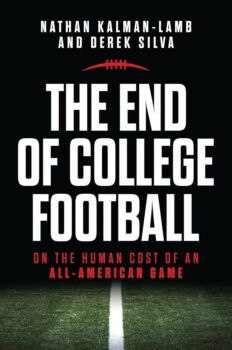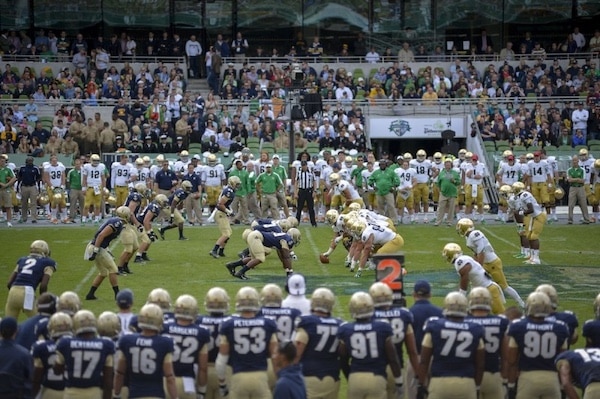This article discusses topics related to suicidality and mental health trauma, which may be distressing to some readers.
“It’s very clear [coach] and the staff don’t take mental health seriously at all. As a matter of fact it seems more like [coach] takes it as a challenge to push you to your brink and to try to make things worse,” a recent ‘Power Four’ college football player who requested anonymity for fear of reprisal told us. He continued,
The majority of the people on the team while I was there were suicidal to the point where we all thought it was normal to feel that way.
This testimony echoes a recent lawsuit brought forward by former Penn State Director of Athletic Medicine, Dr. Scott Lynch. In it, the university’s former team primary care physician, Dr. Pete Seidenberg, testified that coach James Franklin and Athletic Director Sandy Barbour allegedly attempted to get a player who had recently attempted suicide medically disqualified from the team while he was still under psychiatric care.
Indeed, while concern for mental health and self-care are increasingly prevalent across U.S. society, our conversation with this player and the 25 others we spoke to for our new book, The End of College Football: On the Human Cost of an All-American Game, reveal that the world of big-time college football is a clear exception.
These issues must be situated within the political economy of U.S. college athletics, which is driven by football. In the most recently available data, some 49 athletic departments across the country reap $100 million per year, with 22 pulling in more than $150 million. The primary beneficiaries of this money are not the players who produce the commodity spectacle responsible for this value (they receive only a scholarship in return, although this has increasingly been supplemented by third-party name, image, and likeness revenue) but rather the coaches who oversee the extraction of that value. Thirty-five of those coaches make $6 million or more per year as salary, making them the highest paid public employee in most U.S. states. In fact, as of 2022, 2,158 people in the Ohio State athletic department drew salaries, including 148 making $100,000 per year or above, none of whom were athletes.
In order to justify these high salaries and to ensure revenue remains flowing, coaches’ primary task in the college football system is to generate wins by squeezing as much production as they can from players, regardless of the personal toll. This means there is a significant structural dimension to the mental health crisis in the sport: it is a direct result of the way in which college students’ bodies and minds have been instrumentalized to produce value for the institutions putatively accredited to nurture and develop them.
In the book, we came across myriad ways in which mental health crisis manifested in college sport: shocking tales of ubiquitous suicidality; widespread cannabis, painkiller, and even heroin use to cope with psychological strain; post-traumatic stress disorder that had one player waking up vomiting during training camp season years after his football career had ended; and, perhaps most banal for those in this world, constant forms of emotional and verbal abuse.
A recent NCAA study found that 17 percent of men athletes and 44 percent of women athletes reported being constantly overwhelmed, numbers that were higher among non-white, queer, trans and non-binary participants. Remarkably, only 50 percent reported feeling comfortable consulting with a licensed mental health practitioner on campus.
There is a very good reason for this. In many cases, coaches exploit the concept of mental health—as alleged at Penn State—to undermine players perceived to be underperforming. One player explained to us that there is no confidentiality when it comes to accessing mental health services because they are located in the same building as football facilities—so coaches can actually see if players enter. Worse, he said,
A lot of the times, the coach will walk to [psychological services] with you. Like for me, when they tried to mentally disqualify me, they walked with me to the trainers to try to get me mentally disqualified.

The End of College Football: On the Human Cost of an All-American Game (UNC Press, December 2024)
This accords with recent reporting by Bloomberg, which found that at the University of Minnesota, former director of athletic medicine and athletics health care administrator Moira Novak wrote a 10-page memo to the school’s board of regents listing problems in the athletic department that described “coaches in multiple sports [pressuring] medical staff to disclose private information about players’ mental health.” In a similar vein, reported Bloomberg, Minnesota offensive tackle Grant Norton “talked to a therapist in the athletics department and revealed that he’d never felt so alone and depressed.” Subsequently, when he next spoke with his head coach P.J. Fleck,
the coach seemed to know things that he’d confided only to the therapist.
More often, though, coaches simply show little regard for the physical, mental and emotional toll of the sport on players. The former Power Four athlete shared a number of harrowing stories experienced by his teammates: “I knew someone whose brother died and shortly after he was kicked off the team,” he told us. In another case, a “teammate’s father died from COVID and [coach] was visibly harder on him the next workout, making him repeat drills for no reason and just trying to embarrass him in front of the team.” In a third case,
another teammate had a son back home and throughout the recruiting process he was told by [coach] that if he ever felt like he was missing his son he could always reach out and talk to [coach] about it. However, once my teammate got to the university and reached out to [coach] when he was missing his son, [coach] began to chastise and ridicule him for having a son in the first place.
Sometimes players, including the Power Four player himself, would even experience acute mental health crises during team activities:
I remember specifically times where I and others would have mental breakdowns at practice (crying and screaming at the top of our lungs) and for the most part when it happened it would just be ignored until it stopped; nobody besides teammates reached out to see if we were okay.
In fact, he said,
Any sort of problems people had mentally was put into the ‘mental weakness’ category and was ridiculed. And the last people we could tell were the coaches because then we weren’t being ‘mentally tough’ and [coach] would always say, ‘this generation gets more privileges than anyone but complains more than any other generation,’ so it was always made clear that actually discussing mental health problems with the coaching staff was not an option.
These experiences resonate with the findings of our book. One player told us of his need for self-medication with drugs and alcohol to cope with the physical and mental strain from the sport that ultimately manifested in suicidal ideation. “A lot of players would be smoking a lot, but personally, there wasn’t a day where I wasn’t getting absolutely drunk or high out of my mind,” they said.
It escalated to harder drugs, like just anything. And I used to kind of joke about it, but I was like, get so drunk so you don’t really feel the pain of the day, physically and mentally. Because I’ll be walking, morning workouts. And seeing a car drive by, it’s like, man, I wouldn’t have to go to practice if I just jumped in front of his car real quick. Like that was a more attractive idea than going.
The college athletes we spoke to also suggested that coaches showed very little compassion for players struggling with mental health challenges. In one case, a player suffered a panic attack and couldn’t breathe. Although the trainer knew about it, he didn’t inform the coach, who in turn followed the struggling player into the locker room. The player told us,
Then in front of everyone, I start throwing up in the trash can when I got to the top of the stairs. And [the coach is] standing over me, saying, ‘You fucking piece of shit. You’re gonna hurt this team. I’m going to make sure you don’t make a fucking penny.’ In front of everyone.
In fact, the failure of coaches to provide necessary and appropriate support was a consistent theme.
One player, who hoped to medically retire, was required to be in treatment for six months in order to be eligible. He said, “So I had to stick around an extra six months to be able to medically retire. I was pretty much either deciding if I was going to do that, or I was going to kill myself [due to mistreatment by the strength coach]… If I were to do it, I would probably, I don’t know, like, either tweet it out, or write it somewhere.” He explained that this was because he feared being smeared by the coaching staff:
So they wouldn’t be able to change the narrative, like, ‘Oh yeah, this guy, he was using drugs, blah blah blah.’ I would’ve explicitly said, ‘It’s because of these people, and this program, is why I’m doing this.’
Ultimately, he felt so desperate that he resolved to leave prior to the required six months. When the strength coach heard about it, he cornered the player for a private meeting and forced him over a period of hours to explain that he was suicidal, to which he was told, “Everybody else has problems, you know I haven’t seen my dad since I was thirteen.” The player said,
And I was thinking, man, like, ‘I don’t care, I don’t give a shit about your dad. If he knew you was doing this shit—I’m glad he hasn’t seen you either.’
When asked if he felt like he wanted to disclose the information about his mental health to the coach, he told us,
No, because that’s just like somebody that raped you or killed your mom asking you, ‘What’s wrong?’
Our interviews tell us that if college football is defined by anything, we might say that it is trauma.
It seems reasonable to wonder why there is a place for that in higher education.
Nathan Kalman-Lamb is Associate Professor of Sociology at the University of New Brunswick. Derek Silva is Associate Professor of Sociology and Criminology at King’s University College at Western University. They are co-authors of The End of College Football: On the Human Cost of an All-American Game (UNC Press, December 2024) and co-hosts (with Johanna Mellis) of The End of Sport podcast.

